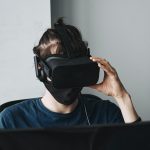Many retail companies are fixated on pursuing new technologies offering a futuristic view on learning. New cutting edge technologies replace traditional and disengaging forms of training with immersive and digitally designed visuals that are lifelike. Virtual Reality (VR) is that futuristic technology. Its overarching aim is to smooth the path to a happy and more productive workforce by placing employees in the front seat of their training. This article will take a look into one of VR training’s current biggest contenders: the retail industry.
VR training speeds up efficiency for large retailers
The retail industry has experienced ample benefits in adopting VR technology, as outcomes showed that employee and consumer experiences were elevated. A 2020 study by PwC decided to put VR training to the test, by focusing on training 1,600 managers and senior leaders on leadership and soft skills. Participants were put into three selective groups, where each group took training in only one of these modalities: v-learning, e-learning or classroom-based learning. Thirty days post training, participants completed an assessment to determine which learning style proved more advantageous than the rest. It was discovered that VR training was four times faster than classroom and 1.25x faster than e-learning. In addition, 78% of participants who trained using VR headsets also stated that they preferred VR to traditional methods of learning.
In an ever growing and demanding market, VR has a lot to offer retail workers in maximising their potential to keep up with the ever evolving consumer. With selling and customer service forming the heart of the retail world, VR training dives deep into the development of soft skills such as empathy training and de-escalation techniques. Coupled with that, new employees are alleviated from the pressures of in-person training and instead can look forward to a more enjoyable yet systematic integration into the retail environment.
There have been several multinational retail companies adopting VR training, in ways that are as versatile and unique as the next. Take IKEA as an example. IKEA has 49 stores worldwide, 160 000 employees internationally. With somewhat high turnover rates, uptaking VR training has been a tactical and time-saving approach to educating staff on the furniture store’s 8 key values and leadership opportunities. The training comes in 18 different languages, and features two IKEA leaders in a 360-degree recorded video giving insightful encouragement on how employees can grow within the company. As IKEA strives to ensure their values are coherent across all their 49 stores, VR training also forms a strong pillar in developing IKEA’s global ‘family’ culture, where diversity and inclusion form the backbone to VR training.
That being said, one of the main factors why retailers are choosing VR training stems from VR’s shorter and far more scalable training sessions. A case study by Harvard Business School in 2020, dived into the impact of VR training since its adoption by three US companies- Verizon, Walmart and Sprouts. The study revealed a startling revelation regarding time and efficiency in using VR compared to traditional methods of training.
To start off, Verizon, had training sessions that involved an enduring ten hours worth of learning. This was cut down to just 30 minutes using VR technology. Likewise, Walmart employees went from a total of 8 hours of training to only 15 minutes, a whopping reduction of 96%. Lastly, Sprouts reported 46% of their employees achieved full marks when using VR headsets, compared with 3% when using traditional methods. These positive results incline VR as a training solution, with a significant scope for better time management, improved efficiency and operational activity within the retail space.
Planning a VR Training Concept? Take a Step Back.
VR training is about unleashing knowledge through intriguing digital concepts that create a greatly memorable training experience.
Things You Need to Consider Before Using VR Training
Before jumping into the process of ideating modules it is important to configure the areas that call out most, when recognising what your employees may need in-depth training in. Consider answering these questions:
- How do I want new employees to view the brand, feel like they belong in the company and are motivated to upkeep their training?
- What skills are most fundamental for employees to thrive in their selling and production roles?
- How can these skills be transpired in a creative way using VR technology?
- How do I want my employees to be perceived by customers?
- Are there any shortfalls in operational processes that I can revolutionise using VR training?
- How can I use VR technology to better prepare employees during the chaos and drudgery of busy (or even quieter) selling periods?
At YESVR, we are highly passionate about advising businesses on how VR training can be used to create a valuable training experience. If you are interested in looking into what VR training can bring to your retail business, please feel free to contact our team, by dropping an email here.
Written by Lauren Tizzone
Similar articles to check out:







